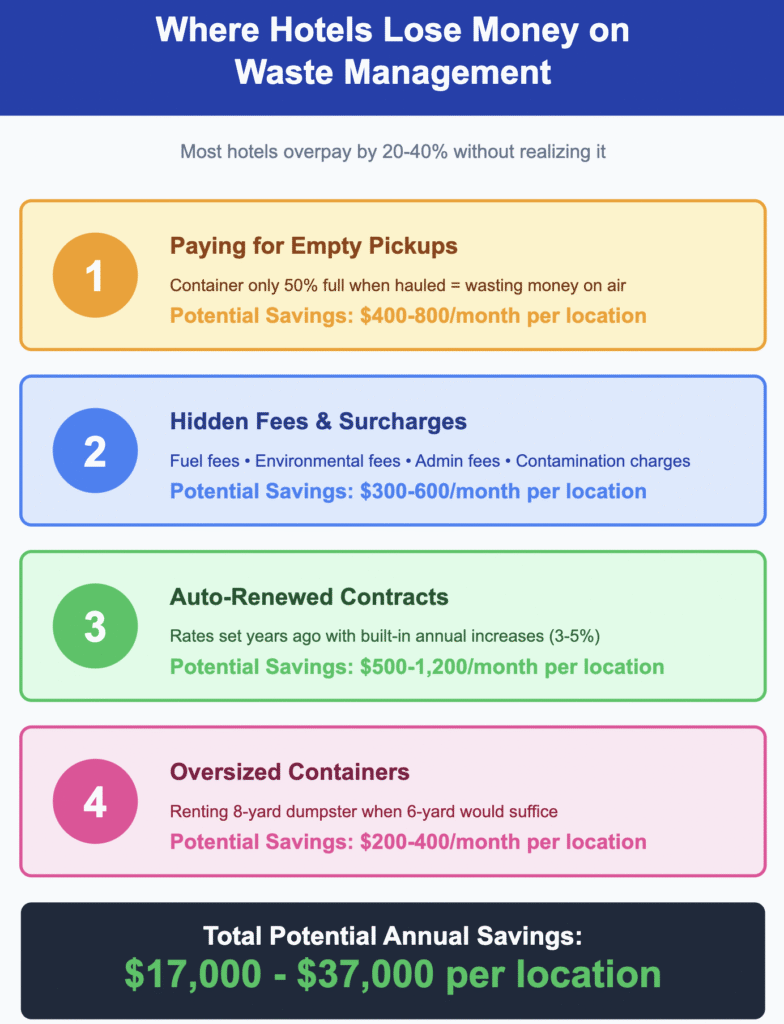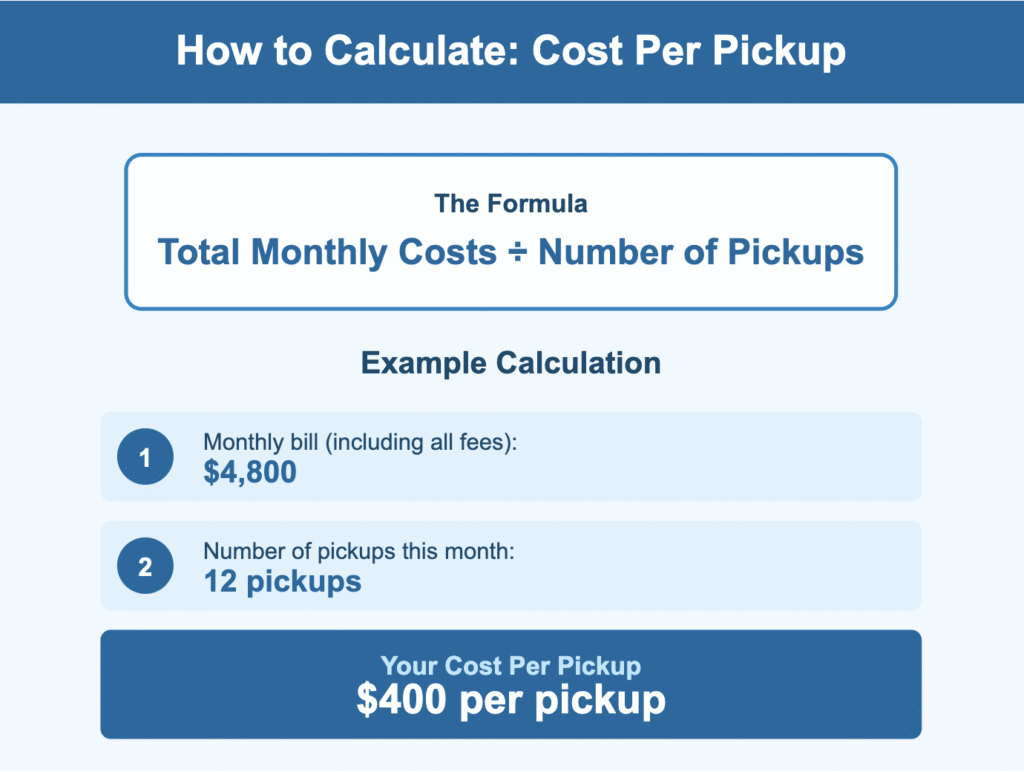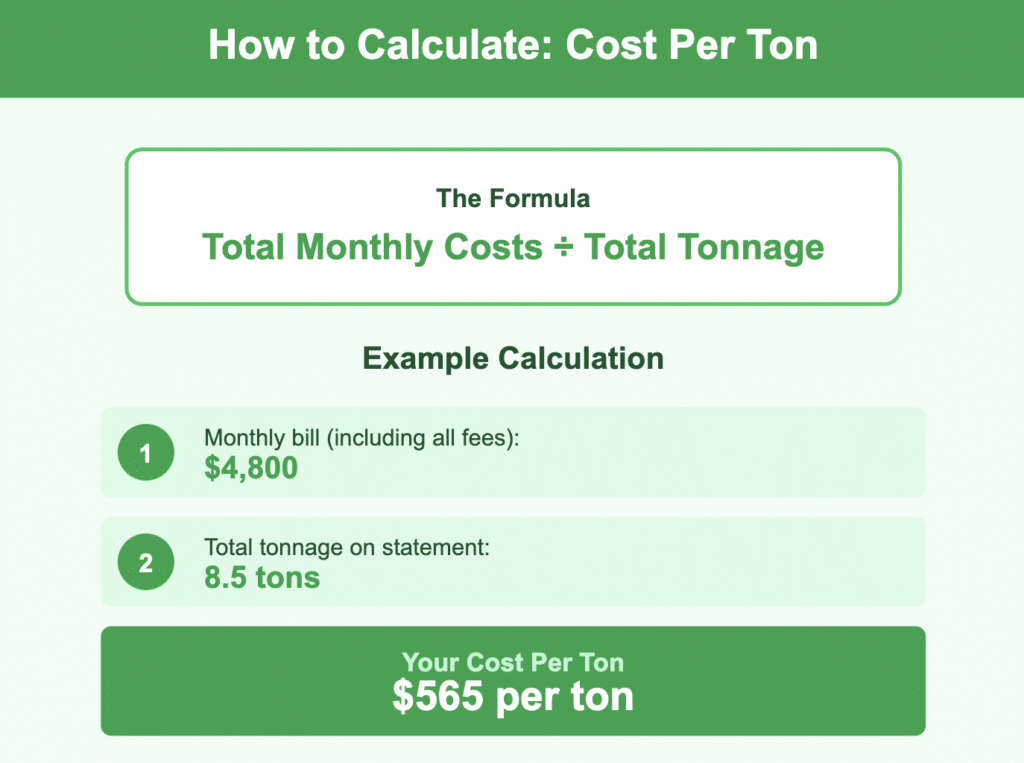Most hotel operators treat waste hauling like a utility bill. You get the invoice, pay it, and move on with your day. But here’s the problem with that approach: waste management companies are counting on you doing exactly that.
Unlike your electricity costs or water bill, waste hauling costs are almost entirely negotiable.
The rates you’re paying right now are easily inflated by 20% to 40% compared to what you could be paying. And your provider is banking on the fact that you’ll never question the invoice or ask for a better deal.
I’ve spent years helping businesses across different industries identify hidden fees and negotiate better rates with service providers. Waste management and trash hauling is where we find some of the biggest savings opportunities, particularly in the hospitality space.
The good news is that you don’t need to switch providers or disrupt operations to cut costs. Read on to learn how.
Why Waste Management Costs Are So High for Hotels and Hospitality Businesses
Your high waste management bill isn’t necessarily an accurate reflection of your waste generation costs. It’s not like you’re all of a sudden producing more waste than you were a year or two ago.
There are several other reasons why your costs are likely much higher than they need to be:
- Combination of multiple services: Hotels pay for multiple pickups per week, container rentals, disposal fees, and a range of other charges to reflect the unique mix of waste that needs to be hauled and sorted.
- Complex waste streams: You’ve got food waste from kitchens and banquets, recyclables from guests, cardboard packages from the shipments you receive, bathroom disposables, linens, and so much more.
- High service frequency: Lots of hotels have fixed pickup schedules that were set years ago and don’t actually reflect current needs.
- Extra fees and surcharges: From contamination fees to fuel charges and beyond, your hauler is always going to look for ways to pad their margins (more on this shortly).
- Neglected contracts: Waste hauling agreements are often auto-renewed for years without review, locking you into outdated pricing and built-in increases every year.
The problem is that waste management pricing is deliberately vague. Haulers have no incentive to help you understand what you’re paying for and why. So it’s nearly impossible for you to compare providers or determine if you’re getting a fair deal.
It’s the same playbook being used by credit card processors, telecom companies, and other service providers who profit by confusing you.

Trash haulers also know that you’re busy. Hotel managers are focused on keeping guests happy, managing staff, and dozens of other operational priorities. Reviewing waste invoices and renegotiating contracts falls to the bottom of your to-do list (if it’s on your list at all).
Read More: 11 Signs You’re Overpaying for Waste Removal Services
Hidden Waste Fees Hotels Don’t Realize They’re Paying
Beyond your base hauling and disposal charges, many hotels pay a variety of other fees that aren’t always easy to spot. And it’s not always clear whether the fee is legitimate or something that can be eliminated.
Common examples of hidden waste management fees for hotels include:
- Fuel surcharges
- Environmental or regulatory fees
- Container maintenance fees
- Administrative fees
- Extra haul fees
- Tipping fees
- Overage fees
- Contamination fees
In isolation, these fees may not seem like they’re worth your time to address. An extra $50 here and there probably isn’t worth losing sleep over when you’re spending millions elsewhere.
But most hotel operators don’t realize that these hidden waste management fees add up quickly and end up costing thousands, if not tens of thousands, of extra dollars every single month.
Haulers are hoping that you just ignore these fees and don’t ask for any justification. That’s why they’re often vague and sound too legitimate to question (even though many of these can be reduced or eliminated altogether).
How to Conduct a Waste Management Audit
The first step to cutting your waste management costs is understanding exactly what you’re paying for. This means conducting a thorough audit of your invoices (and I’m not talking about a quick glance at the total amount due.
Start by pulling your waste management statements for the past 12 months. Having a full year of data is helpful to account for seasonal fluctuations and getting an accurate picture of your spending.
Note: If you manage multiple hotel locations, do this for each property separately.
Look at every single line item on your invoices. Don’t skip anything. Make a list of every fee, surcharge, and service fee that you’re being billed for (even the small ones).
Next, calculate your effective cost per pickup or cost per ton. This will give you a baseline metric that you can use to compare against other providers or negotiate with your current hauler.

To find your cost per pickup, take your total monthly costs (including all service fees) and divide that by the number of pickups you received that month.
For cost per ton, divide your total costs by the tonnage listed on your statement.

Now look for red flags and billing errors. Are you seeing rate increases you don’t remember agreeing to? Are there fees on your statement that weren’t there six months ago? Do your pickup frequencies match what’s actually happening at your properties, or are you being billed for services that you aren’t even receiving?
We’ve even found instances where hotels were being charged for services at locations that no longer exist or containers that were removed months ago. Don’t expect your waste hauler to proactively tell you that they’ve been overcharging you.
Pay special attention to your contract terms.
Expiration dates with auto-renewals and rate escalation clauses guarantee that your waste management fees will increase over time. Most hotel managers can’t recite waste management contract clauses off the top of their heads because it was signed years ago and filed away. So you’ll need to dig out the paperwork and read through it.
The audit process takes time, but trust me, it’s well worth it. You can’t negotiate effectively if you don’t know what you’re paying or where the charges are coming from.
Finding the “Right Size” Waste Service For Your Hotels
Once you’ve completed an audit of your current costs, the next step is for you to make sure that you’re not paying for more services than you actually need.
This sounds obvious, but the majority of hotels we work with are over-serviced (meaning they’re locked into pickup schedules and container sizes that don’t match their actual waste generation).
Start with your pickup frequency. How many times per week is your dumpster getting emptied? Now, how many times per week is your dumpster actually full? If there’s ever a gap here, then you’re wasting money.
Walk out to your dumpster and take a look. If the container is only half full when a truck shows up, you’re literally paying for them to haul air.
Container size is another area where hotels can save money. Some of you might be renting an eight-yard dumpster when a 6-yard would be sufficient.
This next one will obviously vary by property and location, but we typically find that most hotels need to account for seasonal adjustments. Let’s say your busiest season is May through September, and you’re only operating at a 50% occupancy the rest of the year. It’s a big red flag if your waste management bill costs the same in December as it does in July (if one is your busiest month of the year and another is your slowest).
It’s a sign that you’re being overcharged every month, and not that you’re getting a “good deal” in your busy months.
Switching container types can also help save money. For example, having a separate recycling container just for cardboard boxes can actually be cost-effective compared to putting all recyclables in the same bin.
Some properties can even benefit from using a commercial trash compactor to reduce pickup frequency. While there’s a significant upfront investment to consider, it’s worth running a cost-benefit analysis to see if this is right for your hotels.
Waste Reduction Strategies That Actually Save Money For Hotels
Let’s be clear. I’m not going to tell you to implement sustainability initiatives just because they’re good for the environment. That’s not my job. My job is to help you cut costs.
But many waste reduction strategies happen to be good for both your bottom line and the planet. It’s not one or the other.
Producing less waste translates to cheaper waste management costs. And here are some tips that you can implement:
- Cut food waste: Most hotels throw away more food than they realize. These expenses often hit you the hardest because you pay for them twice—first when you buy the food and again when it’s hauled away.
- Train your staff: Having a 30-60 minute session for your staff every six months on proper recycling practices, portion control, and waste sorting can deliver measurable cost savings when you multiply those small improvements across dozens of employees every day.
- Make it easier to recycle: Hotel guests will just throw recyclables in the trash if you don’t give them alternatives. Cutting contamination fees starts with clear signage and plenty of recycling bins throughout your property in as many locations as possible.
- Consider compositing: If you have the space and enough waste volume to justify it, you can start an on-site composting program to reduce the overall tonnage sent to landfills (and some local areas even offer other incentives for composting).
- Bulk purchasing: Do everything you can to eliminate extra packages that just go straight into the dumpster. Everything from toiletries to condiments and cleaning supplies can be evaluated here.
Every pound of waste that you don’t generate is money that you’re not spending to have it hauled away.
These reduction strategies can have an immediate ROI for hotels if you approach them with a cost-cutting mindset instead of just checking off a sustainability box to put on your website.
Negotiating With Your Current Waste Hauler
I’m going to let you in on a secret that your trash hauler doesn’t want you to know. Your waste management fees are negotiable.
If you’ve never negotiated your rates before, then I can pretty much guarantee your current rates have plenty of cushion built in with room to cut costs.
Anything charged by the landfill or transfer station is typically set in stone and can’t be touched. But all of your hauler’s markups, service fees, fuel surcharges, and other line items are on the table.
Spend 30 minutes to get competitive quotes from other waste management providers in your area. Switching is typically not the best option and not even something that we normally recommend. You’re just doing this to create some more leverage.
When you approach your hauler with quotes that are 20% to 30% less than you’re currently paying, they’ll suddenly find room to reduce your rates.
Be direct when you call your provider to initiate this conversation. Don’t apologize or give them an easy out. Tell them you’ve been reviewing your costs, identified rates that don’t seem right, and received quotes from other providers that are significantly cheaper. Tell them you’d prefer to stay with them, but only if you match or beat the quotes.
One of two things is likely to happen here. They’ll either say you’re already getting the best rate (which isn’t true) or offer you a discount (which isn’t going to be their best offer). So keep pushing and escalate this as much as you can to lock in the best terms without all of the built-in escalation clauses and hidden fees.
If you’re managing multiple properties serviced by the same provider, use that volume as more leverage. If you bundle those properties together into a single contract it should be cheaper than treating each hotel as its own location.
Final Thoughts
While trash hauling may not seem like the top priority for your hotel, it’s an expense that you should no longer ignore.
Think about what you could do with an extra $10,000 or $20,000 next year that wasn’t literally spent on garbage. You can put those savings into improvements around the property or do something to enhance the guest experience.
Whatever the case might be, it starts with recognizing the fact that your hotel is likely overpaying for waste management.
Working with a cost reduction consultant can make your life much easier as you’re going through this process. Rather than sorting through dozens of statements and hundreds of line items on your own, we can handle the entire audit process on your behalf.
From there, our team at the Cost Guards can even negotiate directly with your waste management service provider to ensure you get the best possible rates. No need to switch.
